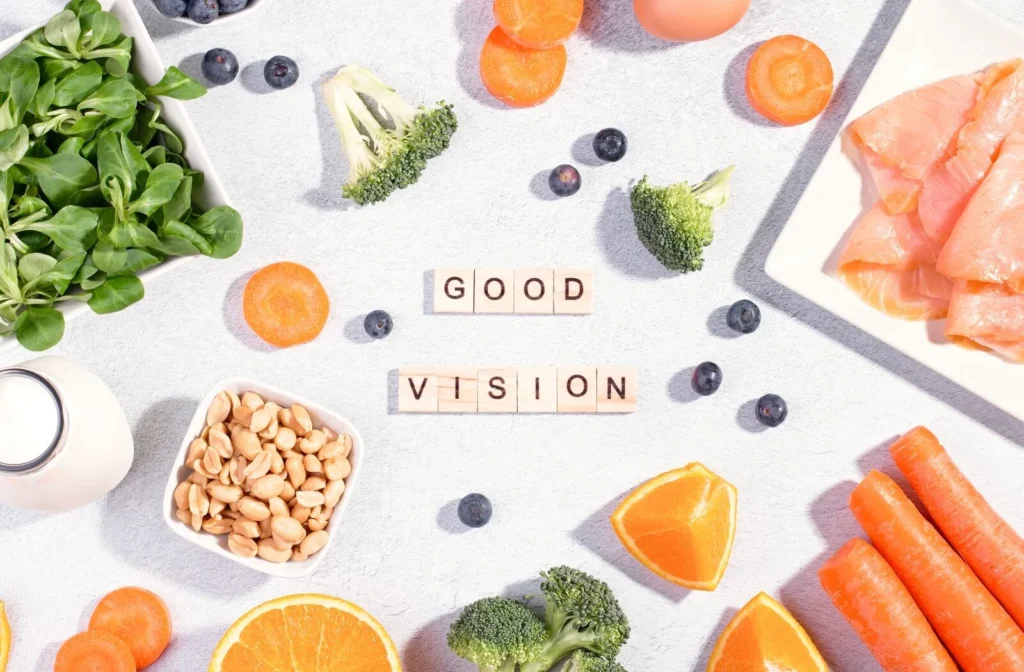Relieve Dry Eye Through Diet
Eye nutrition is a crucial aspect of eye care. Just like booking regular eye exams, practicing eye hygiene, or maintaining your prescription lenses, your diet is something you can do to protect your eye health. Fueling your body with the right nutrients can help your vision and prevent eye diseases. There are also diet tricks and tips to reduce dry eye.
Dry eye can be a chronic condition, with symptoms affecting eye comfort and vision. Our eye care team can offer treatment through dry eye therapy or eye nutrition, but you can get started at home with these 15 best foods for dry eye.
1. Fish
Cold-water fish are a known source of omega-3 fatty acids. Fatty acids are essential to visual development and retina function. Consuming omega-3 fatty acids can lower the risk of dry eye by 17%. In addition, omega-3s can reduce inflammation in the eyes and promote meibomian gland production, responsible for the oily tear layer (reducing tear evaporation).
Some of the best fish for omega-3 fatty acids are:
- Cod
- Herring
- Menhaden
- Salmon
- Sardines
- Tuna
However, suppose you can’t get used to that fishy taste. In that case, our eye nutrition experts at Precision Eye Care can recommend omega-3 supplements.
Fatty fish also contain vitamin D. Although we absorb some vitamin D through the sun, adding vitamin D through diet or supplements is more reliable. Research suggests low levels of vitamin D increase the risk of dry eye. Additionally, vitamin D deficiency may cause decreased tear production, worsening dry eye symptoms.
2. Sweet Potato
Sweet potatoes have a surprising amount of health benefits, mainly due to antioxidants. They’reThey’re also abundant in dietary fibers, vitamins, and minerals.
Sweet potato has more than 200% of the recommended daily dose of vitamin A. Consuming foods rich in vitamin A (or supplements containing vitamin A) can improve tear quality and reduce symptoms of dry eye disease.
3. Carrots
You’ve likely heard carrots are good for your eyesight, and it’s true! While carrots can’t magically transform your vision into 20/20, they contain nutrients essential for eye health.
Carrots are rich in Vitamin A and beta carotene. Beta carotene is what gives carrots their brilliant orange color. It also helps the body produce vitamin A naturally.
4. Avocado
Avocado is a rich source of nutrients most people lack in their daily diets, including magnesium, B6, vitamin C, vitamin E, folate, and potassium. Many nutrients in avocados are essential to eye health and support the tear film.
For example, potassium and magnesium are components that compose the electrolytes in your tears. Electrolytes are the reason tears taste salty. Without our salty tears, our eyes would lack moisture and nutrition to support cells.
Avocados are high in antioxidants and anti-inflammatory compounds, including the carotenoid lutein. These substances help fight oxidative damage and the progression of many chronic diseases. Antioxidants also help protect brain and heart health.
5. Eggs
Scrambled, hard-boiled, sunny side up–whatever way you enjoy your eggs, you’re in for a nutrient-rich dish. Eggs are a source of lutein, zeaxanthin, vitamin C, vitamin E, and zinc.
Lutein and zeaxanthin antioxidants are recommended by the American Optometry Association (AOA), as high amounts of these antioxidants are found in the retina. They can also help prevent multiple eye problems, including cataracts, UV damage, and dry eye.

6. Citrus Fruits
Citrus fruits contain vitamin C, an antioxidant recommended by the American Optometry Association (AOA) for protecting vision and preventing eye diseases. Vitamin C is also a tear film component, aiding lubrication and promoting tear production.
Some go-to citrus fruits include:
- Orange
- Grapefruit
- Lemon
7. Broccoli
You might have heard broccoli is a superfood. Although there’s no such thing as the ultimate vegetable, broccoli does quite pack the nutritious punch. It’s packed with antioxidants and vitamins, including vitamin C and vitamin E. Broccoli is also a source of lutein and zeaxanthin.
8. Spinach & Kale
Leafy greens vegetables, especially spinach and kale, contain multiple vitamins, nutrients, and minerals crucial for whole-body health. Some of the best for eye health and dry eye include lutein, zeaxanthin, and vitamin C.
Kale can be easily added to smoothies, baked into chips, tossed into a salad, or creatively included in other recipes. Although we haven’t seen too many recipes praising spinach chips, spinach can be just as versatile.
9. Bell Peppers
Bell peppers are juicy, delicious, and packed with vitamin C. However, it’s best to consume raw bell peppers, as cooking the food can break down vitamin C.
Brightly colored bell peppers, like red and orange, are also sources of vitamin A and vitamin E.
10. Beans
Beans can add a lot of healthy nutrients to your diet, including B vitamins and zinc. The mineral zinc is how your eye receives vitamin A from the liver, keeping your retina healthy and protecting your eyes from the damaging effects of light.
However, zinc also lowers the amount of copper in your body, necessary for red blood cell production. But beans have zinc and copper! You can boost eye health and maintain your blood cells with these legumes:
- Black-eyed peas
- Kidney beans
- Lima beans
11. Caffeine
Caffeine may seem like an odd choice as it’s best known as a mild diuretic (triggering the need to urinate). However, research suggests caffeine stimulates tear production rather than dehydrating your eyes. As a result, regular caffeine consumption may even reduce the risk of developing dry eye disease.
Caffeine can be found naturally in coffee, black tea, and green tea. Additionally, you can also use caffeine supplements. Although most caffeine pills advertise its use as a stimulant, caffeine can also help improve memory, athletic performance, and headaches. However, it’s worth noting caffeine pills don’t have the antioxidants available in coffee or tea.
12. Nuts
Nuts are also rich in omega-3 fatty acids. In addition, nuts also contain a high level of vitamin E, an ingredient crucial for preventing the breakdown of healthy eye tissue.
Nuts are available for purchase in most grocery stores and online all year round. Notably, if your nuts are candied or added to desserts isn’t beneficial to stopping dry eye, as high blood sugar interferes with tear production. But there are still plenty of options for enjoying nuts.
Nuts good for eye health include:
- Brazil nuts
- Cashews
- Walnuts
13. Squash
Squash compliments hearty meals and healthy eyes. Summer squash is a vitamin C and zinc source, while winter squash is better for vitamin A, C, and omega-3. Additionally, all year-long squash can provide your diet lutein and zeaxanthin.
14. Seeds
Seeds are available year-round and are easily added to your daily diet. They’re also a good source of omega-3 and vitamin E, both essential for eye health and helpful for managing dry eye symptoms.
If you can’t stomach fish or fish oil, some seeds high in omega-3 include:
- Chia Seeds
- Flax seeds
- Hemp seeds
Additionally, sunflower seeds and almonds are high in vitamin E.
15. Water
Technically, water isn’t a food, but it is essential for nutrition. On average, a person’s body is 60% water. Although, that number can vary between 45–75% depending on hydration levels. Staying hydrated maintains and protects our bodies. From lubricating joints to regulating body temperature, water is everywhere in our bodies.
It’s also the most plentiful component of our tears. Water makes up 98% of tears, with 2% containing oils, electrolytes, and proteins. Although that 2% is crucial for nourishing our eyes and preventing tear evaporation, you need enough water to maintain tear quantity.
Contact Us for Eye Nutrition
You may have added some new foods to your grocery list to help ease dry eye symptoms, but you may also be wondering what other foods and supplements can help. 15 might seem like plenty, but there are plenty of options for supporting your eye care with a healthy diet.At Precision Eye Care, we guide our patients with eye nutrition expertise. We can also provide advice about supplements, ensuring you get more vitamins, antioxidants, and other crucial nutrition ingredients. Contact us today and book with one of our Vancouver Washington eye doctors to boost your eye nutrition!





